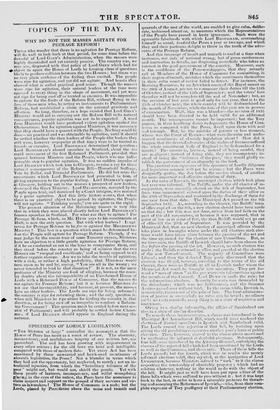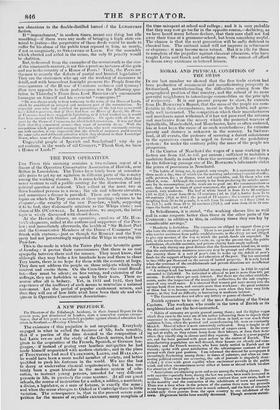SPECIMENS OF LORDLY LEGISLATION.
"THE Statutes at large" contradict the assumptisn that the House of Peers has merit as a court of review. The obscurity, inconsistency, and multifarious iniquity of our written law, are proverbial. The evil has been growing with improvement in every other Science; for the old laws are brief and intelligible compared with those of modern date. Yet every Act has been sanctioned by those unwearied and hawk-eyed sciutineers of slovenly legislation, the Peers! Not a blunder in terms which they had not the opportunity, but neglected, to rectify ; not an in- tentional injustice, from which the "hereditary tribunes of the poor" might not, but would not, shield the people. Yet with these proofs of laziness, incompetency, and wilful wrongdoing glaring in the eyes of the nation, the Peers have the assurance to claim respect and support on the ground uf their services and vir- tues as lawmakers! The House of Commons is a mob; but the Lords, placed by Providence above the noise and tumult and quarrels of the rest of the world, are enabled to give calm, delibe- rate, unbiassed attent:on, to measures which the Representatives of the People have passed in hasty ignorance. Such were the agreeable falsehoods with which Lord BROUGIIAM, overreaching himself as usual, toadied the Peers a year or two ago, and which they and their partisans delight to throw in the teeth of the advo- cates of the Peerage Reform. And this language of insult and untruth is used at a time when instances. not only of national wrong, but of gross carelessness and inattention to details, are disgusting- everybody who takes an interest in the good govornment of the country. Moreover, such is the confidence of the Peer-worshippers, that they actually rail at Members of the House of Commons for committing, in their region of t umult, mistakes which the scrutineers themselves in their calm court of review failed to detect. For instance, the Revising Barristers, by an Act which received the Royal assent on the 20th of August, are not to eminence their duties till the 15th of October, instead of the 15th of September ; and the voters' lists therefore will nor be complete till the end of November : but, as the revision of last year is good only for one year, that is to the 25th of October next, the whole country will be disfranchised for the month of November, while the lists of this year are in process of examination. Well, this was a blunder—the revision of 1835 should have been directed to be held valid for an additional month. The consequences cannot be important; but the Tory papers, in their headlong desire to depreeiate the House of Com- trolls as convene' vu ith the Peers, dwell upon them with zeal and triumph. But, be the mistake of greater or less moment, where was the Court of' Review—what were the calm and undis- tracted scrutineers of slovenly legislation about ? How did it happen that the devoted a &mates of the rights of freemen suffered the whole constituent body of England to be disfranchised for a month? Tie. answer is, because, instead of being careful, they are neglieent instead of' being able, tie:v are incompetent; in- stead of being the " tribunes of the pour,' they would gladly es- tablish the government of an oligarchy in the land. The practical consequences of this specimen of Lordly diligence and legislative acumen will not be serious ; but the Peers were dekignedly guilty, the day before the session closed, of another far more important and offensive violation of duty. I ii the town ofIpswich, the municipal election which took place last year was informal. The Bailiffs, under the old charter of in- corporation, were annually elected on the 8th of September, but front time immemorial entered upon the duties of their office out the 29th of September, and eontinue(1 in the discharge of them for one year from that date. The Municipal Act passed on the 9th September 1835. As, according to the charter, the Bailiff,' term of oflice expiled On the 8th, a new election should have been made on that day ; but this was not done, either from bad faith on the part of the old corporators, or because it was supposed, that in point of law as in point of filet, the then Bailiffs would not go out office of till the 29th of September. It was provided by the Municipal Act, that no new election of municipal officers should take place in boroughs where under the old charters such elec- tions would have taken place between the passing of the act and the time appointed for the election of new Councillors. But, as we have seen, the Bailiffs of Ipswich should have been chosen the Jew befwe the passing of the act. However, no such election was made ; the Bailiff; continued in office, and presided at the election of the new Town-Council. The majority of Councillors were Liberal ; and then the defeated Tory party discovered that the election was illegal, because, according to the terms of the old charter, there were no Bailiffs at nil in Ipswich under whom the Munieipal Act could In) brought into operation.. They put for- ward a " man of straw " to file quo rearra,:to informations against the members of the Council. L■ril DENNr.,N made the rules for the infinenations absolute. Security for costs was demanded by the defendants; which was not fortheaminz, and the Summer Assizes passed over without trial. In the mean while, Ipswich is,
t brow n out of the pale of law. The local administra- tion of justioe is suspended; no rates can be levied ; no officers Paul; no rents received; evely thing is in a state of confusion and annoyance.
Owing to a similar informality, the affairs of Sunderland are also in a stale of sin lar disorder.
To remedy these inconveniences, a clause was introduced in the
Municipal Act Amemlinent Bill, which would have rendered the elections of Town-Councillors in Ipswich and Sunderland valid. The Lords caused the rejection of that bill, by. insisting upon giving the old peculatine corporators another year s lease of public civilities. They, however, azreed to the clause above mentioned for confirmimme. the informal or doubtful elections. Subsequently, four bills were introduced by the Attornev-General, embodying the clauses of the rejected bill which had been sanctioned by the Lords as well as the Commons, and those only. Three of these bills the Lorle passed; but the fourth, which was to render the merely hiformal elections valid, they rejected, at the instigation of Lord Lveottuase, because Ministers refused to "tack" to it time clause respecting the trusteeship of charitable property ; which had no relation whatever, nothing in the world to do with the object of the bill. It might just as well have been put upon either of the three bills which were suffered to pass without it . but it was kept bark to the last, in order to have a miserable pretence for thwart- ing and annoying the Reformers of Ipswich,—who, from their com- plete exposure of Tory profligacy at their Parliamentary election, are obnoxious to the double-distilled hatred t f the LYNDHURST faction.
If" impeachment," in modern times, meant any thing but idle mouthing—if there were any mode of bringing a high state cri-
minal to justice—the perpetrator of these deeds would be made to suffer for his abuse of the public trust reposed in him, as surely, if not so sanguinely, as STRAFFORD or LAUD. For the assembly which abetted and aided in the crime, the only fit penalty would be abolition.
But, to descend from the examples of the seventeenth to the sins of the nineteenth century, is not this a precious instance of the gain and use to the country of a House of Peers ? Truly, the Peers are the men to remedy the defects of partial and hurried legislation ! They are the statesmen who spy out the working of measures in
detail, and with benevolent foresight preserve the People from the consequences of the 11 use of Commons rashness and tyranny ! How very apposite to their performances was the following quo- tation in Thursday's Times from Lord BROUGHAM'S encomiastic harangue on himself and his eoroneted "comrogues !"
" He was always ready to bear testhnony to the value of the House of Lords, which he considered an integral and necessary part of the constitution. No impartial man who had watched the proceedings of the last two years could
have failed to perceive, that if there had been no House of Lords, the House of Commons must Imre stopped its leyislation, ot if it had worked on, it would have been covered with blunders and absurdities. He spoke with all due re- spect for the House of Commons, for which he felt veneration. It was not their fault that they connuitted errors—they must of necessity do so. With the competition which prevailed amongst 655 men, who were constantly striving one with another, it was impossible that the details of measures could receive the same cubit and deliberate attention which they obtained in their Lordships' House, where none of those distractions prevailed."
Ungrateful people of Ipswich and Sunderland ! why do ye not exclaim, in the words of old COBBETT, "Thank God, we have a House of Lords!"



























 Previous page
Previous page